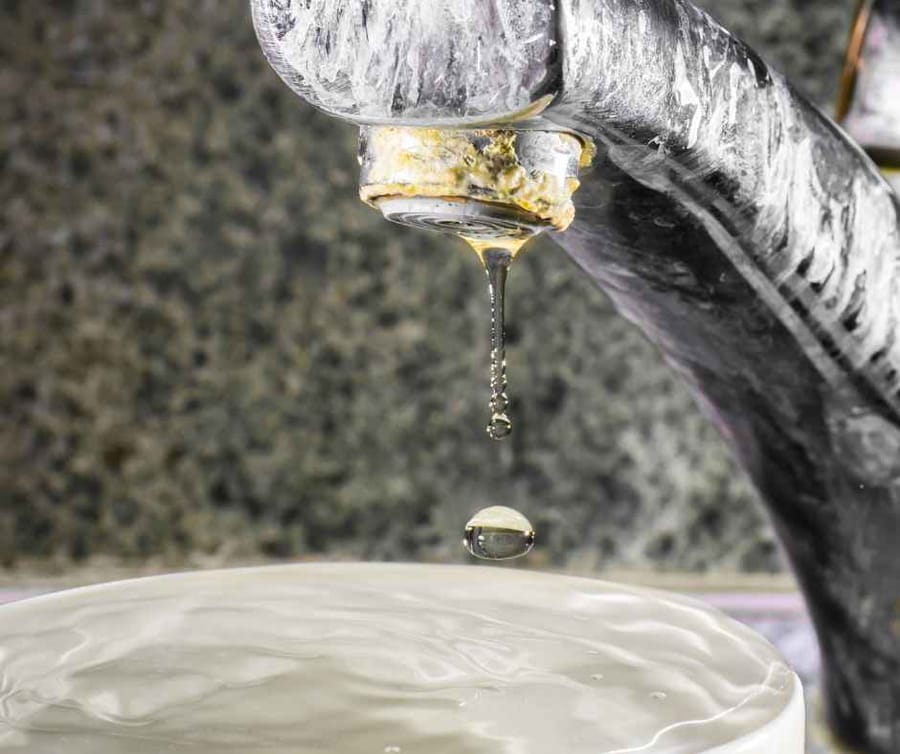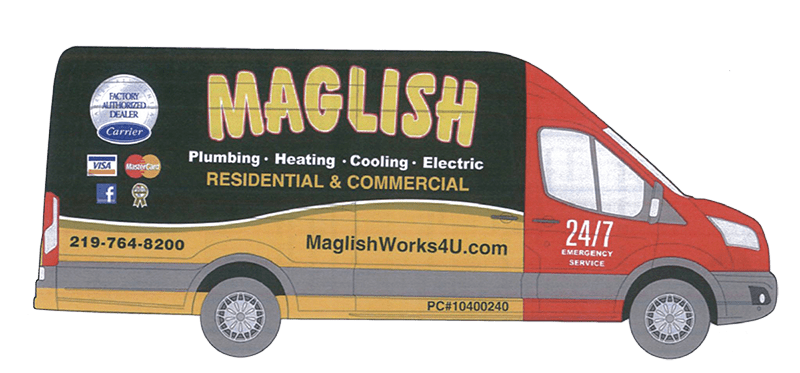
Most Indiana homeowners don’t think twice about the water flowing from their taps until white spots start showing up on dishes, or their water heater starts working overtime. The culprit? Hard water. And while it might seem like a minor nuisance, the truth is, hard water can quietly cause costly damage throughout your home.
Hard water contains high levels of calcium and magnesium. These minerals may be harmless to your health, but they’re far from friendly to your plumbing, appliances, and skin. Over time, they build up in pipes and water-using appliances, reducing efficiency and leading to expensive repairs or replacements.
You might not see it happening, but the longer you let hard water go untreated, the more it chips away at your home’s systems—and your wallet. Energy bills climb. Appliance lifespans shrink. Soap doesn’t lather the way it should. Even your laundry and hair suffer.
In this blog, we’ll uncover how hard water impacts your home, the warning signs to watch for, and how a quality water softener system can reverse the damage. If you’re tired of fighting scale and stains, it’s time to take action.
What Is Hard Water and Why Is It Common in Indiana?
Hard water is water that contains high concentrations of dissolved minerals, mainly calcium and magnesium. These minerals make their way into the water supply as it travels through soil and rock, picking up mineral content along the way. While hard water is not dangerous to drink, it causes a wide range of issues inside homes, especially for plumbing and appliances.
In Indiana, hard water is incredibly common due to the region’s limestone-rich geography. Both municipal water systems and private wells in the state are affected by this natural mineral content. Homes in Northwest Indiana, for example, often experience some of the hardest water levels in the country. Whether you live in a city or a rural community, chances are your tap water contains enough hardness to create long-term problems if left untreated.
The impact of hard water can vary depending on where you live, but the symptoms are often the same: scale buildup, soap scum, poor appliance performance, and dry skin. That’s why understanding the signs of hard water in your own home is the next critical step.
Signs You Have Hard Water at Home
Hard water issues often build gradually, making them easy to dismiss until the damage is already done. From visible mineral deposits to subtle changes in how your home feels and functions, recognizing the signs early can help you take action before your plumbing or appliances suffer.
Visible Clues Around the House
One of the most obvious signs of hard water is the presence of white, chalky buildup on your faucets, showerheads, and around drains. This residue is caused by minerals crystallizing as the water evaporates, and it’s notoriously hard to clean.
You may also notice spots on your dishes and glassware after they come out of the dishwasher, even when using rinse aids. These water spots form when calcium deposits are left behind during drying.
Another red flag is soap that doesn’t lather well. Because calcium and magnesium react with soap, it becomes less effective. This means you end up using more soap, shampoo, and detergent just to get clean.
Effects You Might Not See Immediately
Hard water doesn’t just leave behind visible buildup; it also affects how your home functions over time. You might feel its effects in subtle ways, like:
-
Dry, itchy skin and dull hair after showering, even when using quality products
-
Reduced water pressure, especially in older homes, due to scale buildup narrowing your pipes
-
Appliances running longer or working harder, especially your water heater, dishwasher, or washing machine
Over time, these small signs can become costly problems.
The Hidden Costs of Hard Water
While hard water might seem like a mild inconvenience, it’s quietly adding expenses to your utility bills, appliance maintenance, and plumbing system. Many homeowners are surprised to learn just how costly untreated hard water can be over time.
Higher Utility Bills
Hard water significantly reduces the efficiency of water-using appliances. As minerals build up inside your water heater’s tank or heating elements, it becomes harder for the system to heat water, meaning it consumes more energy to do the same job. This added strain can raise your gas or electric bills each month without you realizing the source.
Even your dishwasher and washing machine use more energy and water to deliver acceptable results when hard water interferes with their function. That inefficiency translates directly into higher utility costs.
Frequent Plumbing Repairs
Mineral deposits don’t just collect on fixtures—they form thick layers inside your plumbing lines, narrowing the path for water to flow. This leads to reduced water pressure, sluggish drainage, and increased wear on valves and fittings. Left unchecked, scale buildup can lead to pipe corrosion, clogs, or even premature pipe failure, especially in older plumbing systems.
Over time, you may find yourself calling for repairs more frequently, replacing fixtures more often, and dealing with unexpected plumbing emergencies that could have been avoided with water treatment.
Reduced Appliance Lifespan
From water heaters to dishwashers, appliances that rely on water are particularly vulnerable to hard water damage. Scale accumulation in critical components causes appliances to work harder, wear out faster, and break down more often.
This means you’ll be replacing appliances sooner than expected—sometimes years ahead of schedule. The cost of replacing just one water heater or washing machine far exceeds the cost of installing a water softener system.
When added up, these hidden costs can drain your budget year after year. Fortunately, there’s a long-term solution.
Water Softener Systems: The Smart Solution
If hard water is quietly sabotaging your plumbing, appliances, and comfort, a water softener is the most effective way to stop the damage in its tracks. These systems are designed to remove the minerals that cause hard water problems—offering immediate and long-term benefits for your entire home.
How Water Softeners Work
Water softeners use a process called ion exchange, where calcium and magnesium ions are removed from the water and replaced with sodium or potassium ions. This exchange takes place in a tank filled with resin beads that attract the hard minerals. Once saturated, the system regenerates using a brine solution, flushing away the accumulated minerals and resetting the resin for continued use.
There are two main types of systems:
-
Salt-based water softeners, which are highly effective for homes with moderate to severe water hardness
-
Salt-free systems, which don’t remove minerals but condition the water to reduce buildup—best for homes with mild hardness or for those looking for low-maintenance options
Choosing the right system depends on your water hardness level, household size, and personal preferences. A professional water test is the first step in identifying the best solution.
Benefits for Your Home and Health
Installing a water softener does more than protect your pipes—it improves your daily experience across the board:
-
Plumbing protection: Prevents future scale buildup in pipes and fixtures
-
Longer appliance life: Reduces wear and breakdowns for water heaters, dishwashers, and more
-
Better cleaning results: Soaps and detergents lather properly, and dishes come out spotless
-
Improved skin and hair health: Soft water is gentler and leaves you feeling clean, not dry
-
Laundry that feels fresher: Clothes and towels come out softer, brighter, and longer-lasting
For Indiana homeowners, a water softener isn’t just a luxury—it’s a smart investment in the long-term health of your home.
Maintaining Water Softener Performance
Once you’ve invested in a water softener system, it’s important to keep it running efficiently to get the full benefit. While these systems are relatively low-maintenance, a few routine steps go a long way in ensuring consistent performance and longevity.
Schedule Regular Professional Maintenance
Just like your HVAC or plumbing systems, your water softener needs periodic attention from a professional. Annual inspections can help identify issues such as salt bridging, worn-out resin, or valve problems before they affect water quality. A technician can also verify that the system is set correctly based on your home’s water hardness level and usage patterns.
Check Salt Levels and Keep the Brine Tank Clean
If you have a salt-based softener, check the salt level in the brine tank about once a month. It should always be at least half full. Use high-quality salt pellets to reduce buildup and prevent blockages. Occasionally, you may need to clean the brine tank to remove sediment or mushy salt that interferes with regeneration.
Test Your Water Hardness Periodically
Water conditions can change over time, especially if your home switches between well and municipal water sources. Testing your water every year or two ensures that your system is still effectively treating the current hardness level. If the water starts to feel “hard” again—like soap no longer lathers or you notice spots on dishes—it may be time for a tune-up or resin replacement.
By staying on top of these simple tasks, you’ll maximize your softener’s lifespan and keep your water quality consistently high.
Don’t Let Hard Water Drain Your Budget
Hard water might be common across Indiana, but that doesn’t mean you have to live with its costly effects. From skyrocketing utility bills and plumbing repairs to dry skin and damaged appliances, the impact of hard water reaches every corner of your home. Fortunately, these problems are both preventable and reversible—with the right solution.
Installing a water softener not only protects your plumbing system and appliances but also enhances your day-to-day comfort. Soft water helps you clean more effectively, feel better after a shower, and avoid the slow, silent damage caused by mineral buildup.
At Maglish Plumbing, Heating, Cooling & Electric, we help homeowners throughout Northwest Indiana take control of their water quality. Whether you need a water test, expert guidance, or a complete water softener installation, our team is here to help you get the job done right.
Contact Maglish Plumbing, Heating, Cooling & Electric today to schedule your water test and take the first step toward cleaner, softer, more efficient water in your home.


